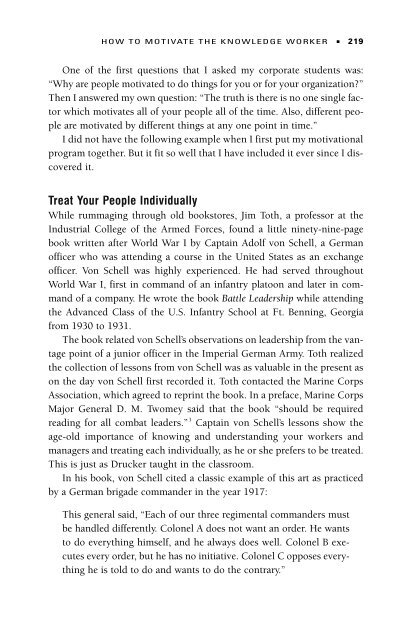A Class with Drucker - Headway | Work on yourself
A Class with Drucker - Headway | Work on yourself
A Class with Drucker - Headway | Work on yourself
Create successful ePaper yourself
Turn your PDF publications into a flip-book with our unique Google optimized e-Paper software.
HOW TO MOTIVATE THE KNOWLEDGE WORKER ■ 219<br />
One of the first questi<strong>on</strong>s that I asked my corporate students was:<br />
“Why are people motivated to do things for you or for your organizati<strong>on</strong>?”<br />
Then I answered my own questi<strong>on</strong>: “The truth is there is no <strong>on</strong>e single factor<br />
which motivates all of your people all of the time. Also, different people<br />
are motivated by different things at any <strong>on</strong>e point in time.”<br />
I did not have the following example when I first put my motivati<strong>on</strong>al<br />
program together. But it fit so well that I have included it ever since I discovered<br />
it.<br />
Treat Your People Individually<br />
While rummaging through old bookstores, Jim Toth, a professor at the<br />
Industrial College of the Armed Forces, found a little ninety-nine-page<br />
book written after World War I by Captain Adolf v<strong>on</strong> Schell, a German<br />
officer who was attending a course in the United States as an exchange<br />
officer. V<strong>on</strong> Schell was highly experienced. He had served throughout<br />
World War I, first in command of an infantry plato<strong>on</strong> and later in command<br />
of a company. He wrote the book Battle Leadership while attending<br />
the Advanced <str<strong>on</strong>g>Class</str<strong>on</strong>g> of the U.S. Infantry School at Ft. Benning, Georgia<br />
from 1930 to 1931.<br />
The book related v<strong>on</strong> Schell’s observati<strong>on</strong>s <strong>on</strong> leadership from the vantage<br />
point of a junior officer in the Imperial German Army. Toth realized<br />
the collecti<strong>on</strong> of less<strong>on</strong>s from v<strong>on</strong> Schell was as valuable in the present as<br />
<strong>on</strong> the day v<strong>on</strong> Schell first recorded it. Toth c<strong>on</strong>tacted the Marine Corps<br />
Associati<strong>on</strong>, which agreed to reprint the book. In a preface, Marine Corps<br />
Major General D. M. Twomey said that the book “should be required<br />
reading for all combat leaders.” 3 Captain v<strong>on</strong> Schell’s less<strong>on</strong>s show the<br />
age-old importance of knowing and understanding your workers and<br />
managers and treating each individually, as he or she prefers to be treated.<br />
This is just as <str<strong>on</strong>g>Drucker</str<strong>on</strong>g> taught in the classroom.<br />
In his book, v<strong>on</strong> Schell cited a classic example of this art as practiced<br />
by a German brigade commander in the year 1917:<br />
This general said, “Each of our three regimental commanders must<br />
be handled differently. Col<strong>on</strong>el A does not want an order. He wants<br />
to do everything himself, and he always does well. Col<strong>on</strong>el B executes<br />
every order, but he has no initiative. Col<strong>on</strong>el C opposes everything<br />
he is told to do and wants to do the c<strong>on</strong>trary.”


